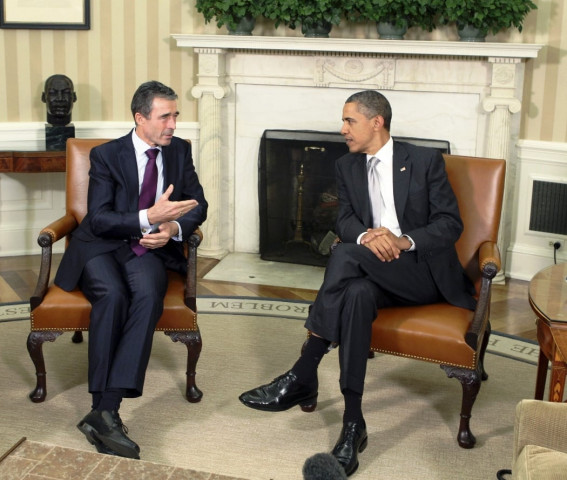Obama meets NATO chief, discusses Afghan transition
President and the Secretary General discussed the important progress made by the NATO-led ISAF mission in Afghanistan.

Obama and Rasmussen spoke in the Oval Office in a meeting opened briefly to still photographers but closed to reporters, and the White House said the two men also reviewed NATO's Libya operation.
The White House said that Obama and Rasmussen discussed the NATO summit in May next year, which the president will host in his adoptive hometown of Chicago, and the need to broaden alliance ties with non partner nations.
"Additionally, the President and the Secretary General discussed the important progress made by the NATO-led ISAF mission in Afghanistan," a White House statement said.
It said the talks also centered on "how the Chicago Summit might shape the next major phase of transition in Afghanistan, consistent with the Lisbon Summit goals and the President's June 22 speech on Afghanistan."
At the NATO summit in Lisbon last year, the alliance agreed a plan to bring all troops home from Afghan battlefields by 2014 after transitioning security responsibility to Afghan forces.
Last June, Obama ordered all 33,000 US surge troops home from Afghanistan by the middle of 2012 and declared the beginning of the end of the war, vowing to turn to nation building at home.
And just last week, it emerged that Obama's advisers were debating a shift in military policy in Afghanistan that would scale back the military's mission and focus on advising Afghan forces much earlier than planned.
The Wall Street Journal first broke the story, reporting Thursday that top officials have discussed revising operations and that the move could possibly be approved as soon as the Chicago summit in May.
Obama and Rasmussen also agreed that "by acting quickly and decisively NATO saved the lives of thousands of Libyan civilians," a White House statement said.
The White House was criticized over its role in the Libyan operation by Republicans who said that it showed insufficient leadership in the operation, allowing allies like France and Britain to shoulder much of the combat duties.
But Obama aides refuted the criticism that they were "leading from behind" on the effort, noting the initial US barrage that took out Libyan air defenses and a support role that including vital intelligence assets.
US ambassador to NATO Ivo Daalder said Monday the president's tactics "made room for allies to be allies."
"This is the new NATO at work, a NATO where American leadership is essential, where the American military is indispensable, but where America doesn't have to do it all," Daalder said at the Atlantic Council.
"No country in the world can do what America can, especially when it comes to capabilities like (intelligence, surveillance and reconnaissance) aerial refueling, jamming and targeting.
"If Libya was to be successful, the United States had to do what only the United States could do."
The meeting between Rasmussen and Obama came a week after NATO formally ended its mission in Libya, saying that it had fulfilled a UN mandate to protect civilians in an operation that helped topple Kadhafi.
Rasmussen was also meeting US Secretary of State Hillary Clinton, Defense Secretary Leon Panetta, National Security Advisor Tom Donilon and members of the Senate, his press office said in a statement Sunday.



















COMMENTS
Comments are moderated and generally will be posted if they are on-topic and not abusive.
For more information, please see our Comments FAQ